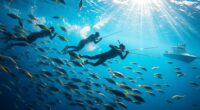To practice conservation in spearfishing, focus on targeting mature, legal-sized fish and avoid protected or endangered species. Follow local regulations, including size and bag limits, and respect marine protected areas. Use humane killing methods and handle fish properly to guarantee healthier populations. Minimize habitat contact and avoid disturbing fragile environments like coral reefs. By adopting these best practices, you help sustain fish stocks and marine ecosystems—continue exploring how to make your spearfishing more eco-friendly.
Key Takeaways
- Target only mature, legal-sized fish to ensure reproductive health and population sustainability.
- Follow local regulations, size limits, and seasonal restrictions to prevent overharvesting.
- Minimize habitat contact and avoid fragile ecosystems like coral reefs during spearfishing.
- Practice humane kills with quick, precise shots to reduce fish suffering.
- Engage in community conservation efforts, such as invasive species removal and marine protected areas.
Understanding the Principles of Sustainable Spearfishing
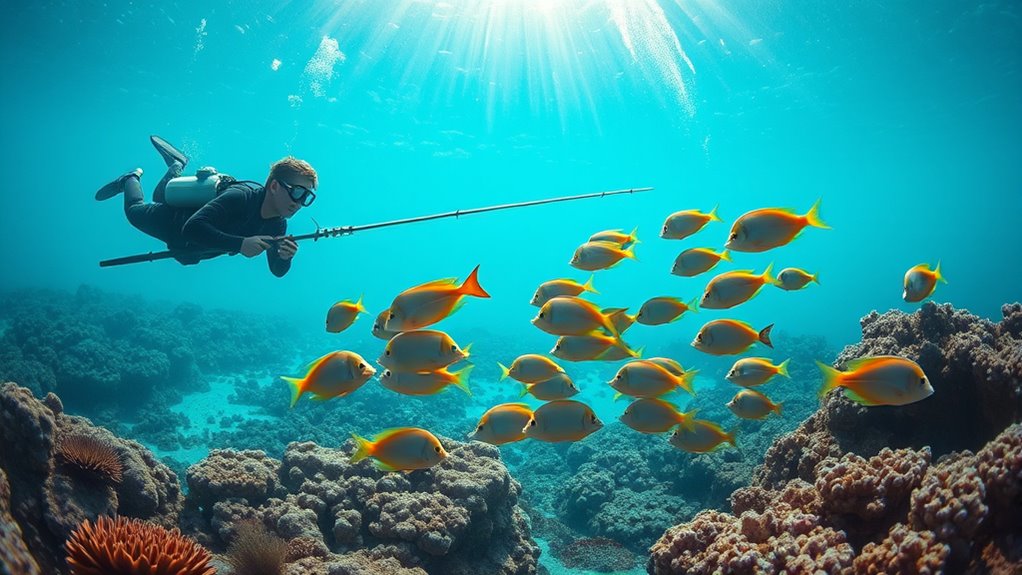
Understanding the principles of sustainable spearfishing is essential for minimizing your environmental impact while enjoying the sport. Sustainable spearfishing emphasizes selective catch, targeting only mature, legal-sized fish to protect fish populations and marine ecosystems. By adhering to local regulations, including size and bag limits, you support conservation efforts and help maintain healthy ecosystems. This approach also involves understanding the local marine environment to avoid overharvesting sensitive habitats. It avoids bait, reducing pollution and bycatch, and typically focuses on shallow waters to minimize habitat disturbance. Ethical spearfishing also involves humane kills, ensuring fish are used for consumption rather than waste. Additionally, utilizing noise reduction technologies on equipment can help prevent disturbing aquatic life during your dives. Employing selective fishing methods ensures that only appropriate species and sizes are harvested, further supporting conservation efforts. Understanding the importance of foraging range and its influence on fish behavior can help you plan more effective and sustainable harvests. Using proper handling techniques minimizes stress and injury to the fish, promoting healthier populations. By aligning your practices with these principles, you actively contribute to marine conservation, balancing your passion for spearfishing with the preservation of the environment for future generations.
Legal Considerations and Regulatory Compliance

Making sure you comply with local laws and regulations is a vital first step in responsible spearfishing. You must familiarize yourself with regulations regarding species limits, seasonal restrictions, and protected species to avoid illegal practices. Obtain any permits or licenses required by authorities to ensure legal compliance and support sustainable practices. Be aware of restrictions within marine protected areas, such as bans on spearfishing in certain zones or during specific times of the year. Staying updated on legal requirements helps prevent penalties and promotes conservation efforts. Always respect local laws and regulations, as they are designed to protect marine ecosystems and ensure the long-term health of fish populations. Following these legal considerations demonstrates your commitment to responsible and sustainable spearfishing. Additionally, understanding regulatory compliance can help you make informed decisions about the types of gear and methods you use, further supporting conservation efforts. Being aware of the emerging technologies in monitoring and enforcing regulations can also enhance compliance and reduce unintended violations. Knowing divorce laws in your area can also serve as an analogy for the importance of understanding complex legal frameworks to stay within legal boundaries and promote responsible conduct.
Ethical Harvesting and Species Selection
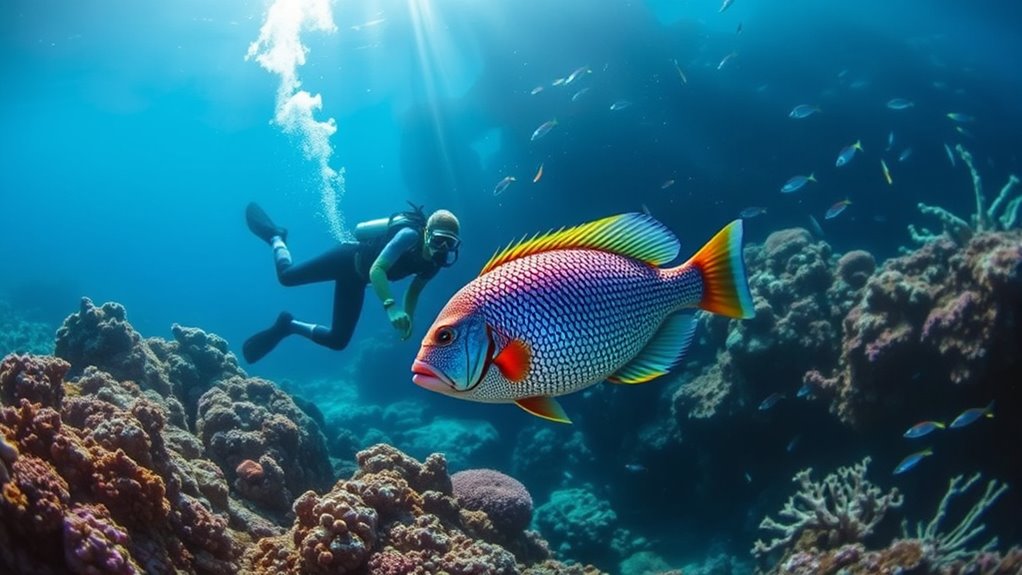
Practicing ethical harvesting means targeting only fish that meet legal size limits and are abundant enough to support sustainable populations. Your species selection should focus on mature, non-endangered fish to promote responsible spearfishing and marine conservation. By adhering to conservation regulations and respecting size and bag limits, you help minimize the ecological impact of your catch. Prioritize humane killing techniques, such as quick shots behind the eyes, to reduce fish suffering and uphold ethical standards. Responsible sourcing ensures that each catch is edible and contributes to sustainable fishing efforts. Making mindful choices about what species you target supports healthy ecosystems and preserves fish populations for future generations. Ethical harvesting isn’t just about compliance; it’s about actively contributing to the long-term health of our oceans. Incorporating species selection strategies that favor resilient and common fish helps maintain balanced marine environments and can also improve cognitive function by fostering a deeper understanding of marine ecosystems.
Responsible Techniques for Minimizing Environmental Impact
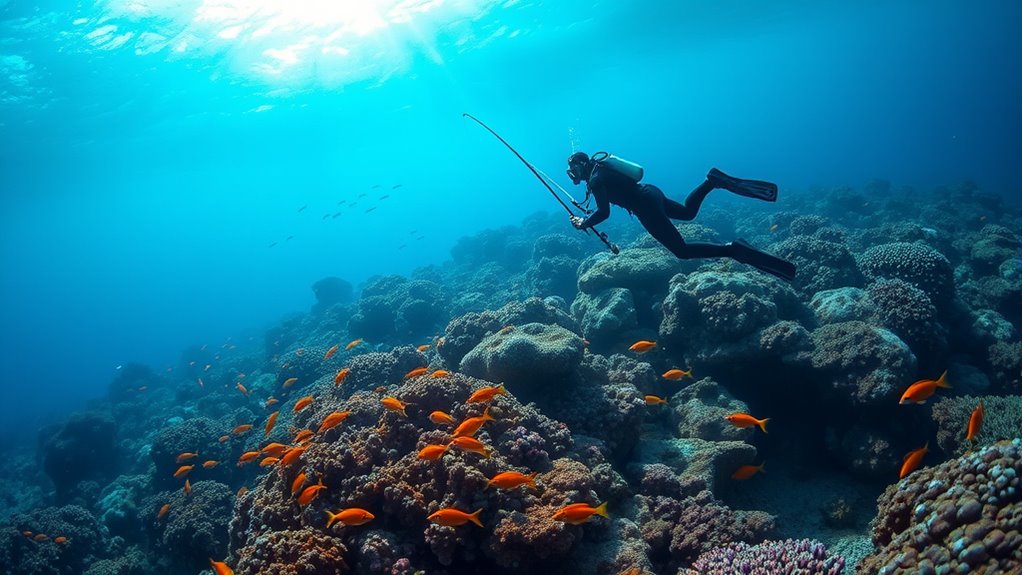
To minimize your environmental impact while spearfishing, focus on selective targeting by aiming only for mature, legal-sized fish. This practice supports sustainable practices and helps prevent overfishing. Be mindful of habitat protection by controlling your approach and avoiding contact with sensitive areas like coral reefs and seagrass beds. Follow local regulations and size limits to ensure compliance with marine conservation efforts. Target invasive species to aid ecological balance and reduce pressure on native populations. Use humane killing methods, such as quick, precise shots and a dive knife, to minimize fish suffering.
- Prioritize selective targeting over indiscriminate harvest
- Minimize contact with fragile habitats
- Respect local regulations and conservation measures
Promoting Conservation and Community Engagement
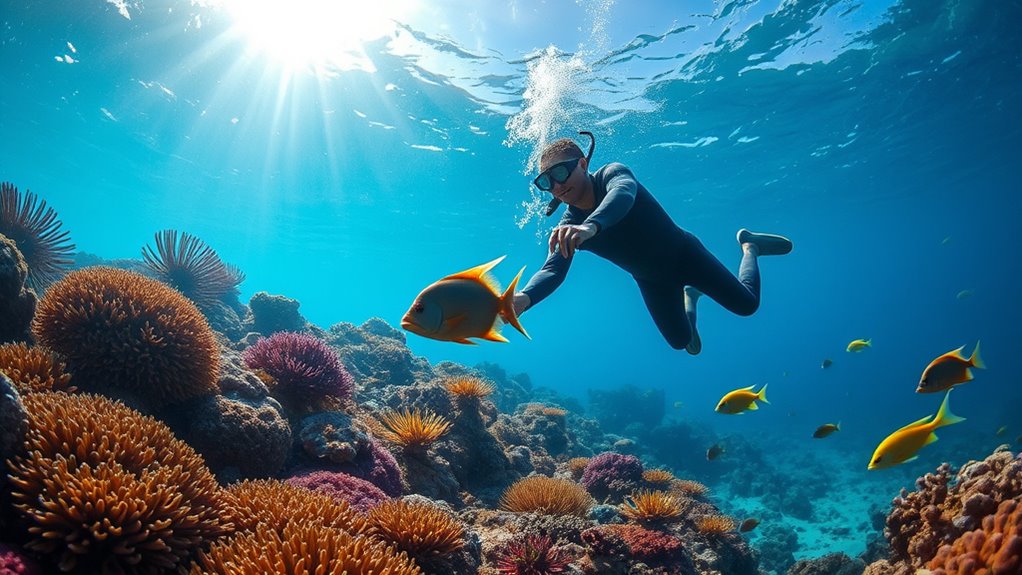
Promoting conservation and community engagement is essential for the long-term health of marine ecosystems. By actively participating in community involvement, you help support marine conservation efforts that protect crucial habitats through initiatives like marine protected areas and invasive species removal. Engaging with fellow divers and local communities fosters a shared sense of responsibility, encouraging responsible spearfishing and ethical harvesting practices. Educating others about the environmental impact of unsustainable methods promotes a culture of stewardship and conservation-minded behavior. Supporting sustainable practices ensures fish populations remain healthy for future generations. Your involvement in conservation efforts not only preserves marine biodiversity but also strengthens community bonds. When everyone commits to responsible spearfishing and conservation, we create a positive ripple effect that benefits the environment and everyone who depends on it. Additionally, understanding Private Placement Equity Markets can help investors identify sustainable investment opportunities that align with conservation goals. Incorporating predictive analytics into conservation strategies can further enhance the effectiveness of protecting marine ecosystems. Moreover, implementing sustainable fishing practices is crucial in maintaining the balance of marine life and ensuring the longevity of fishing resources. Embracing innovative AI-driven monitoring technologies can greatly improve the accuracy and efficiency of conservation efforts. Furthermore, adopting marine protected areas as a conservation tool can help safeguard critical habitats and encourage biodiversity.
Frequently Asked Questions
How Can I Identify Protected or Overfished Species Before Spearfishing?
To identify protected or overfished species before spearfishing, you should familiarize yourself with local regulations and species lists. Check official marine conservation websites or local authorities for updated information. Use reliable identification guides or apps to recognize species visually. Always pay attention to size and bag limits, and avoid species marked as protected. Staying informed helps you fish responsibly and supports marine conservation efforts.
What Are the Best Ways to Avoid Disturbing Marine Habitats During Dives?
Diving diligently, you can avoid disturbing marine habitats by practicing prudent positioning, maintaining minimal movement, and respecting delicate ecosystems. Pay close attention to your surroundings, steer clear of fragile coral reefs, and avoid touching or anchoring on seafloor structures. By being mindful and methodical, you preserve the pristine environment, prevent pollution, and promote healthy habitats. Your careful conduct guarantees vibrant underwater worlds remain vibrant for future friends and divers alike.
How Do Seasonal Restrictions Vary Across Different Regions?
Seasonal restrictions vary depending on the region to protect local marine life during critical breeding or spawning times. You’ll find rules differ widely; some areas close certain zones during specific months, while others limit gear use or fishing hours. Always check local regulations before your dive, as they’re designed to preserve ecosystems and ensure sustainable spearfishing. Staying informed helps you enjoy responsible diving and supports conservation efforts.
What Training Resources Are Available for Responsible Spearfishing?
Think of responsible spearfishing training resources as a lighthouse guiding your way. You can find online courses, local workshops, and certification programs that teach sustainable practices. Organizations like the International Underwater Spearfishing Association offer valuable guidance. These resources help you learn proper hunting techniques, local regulations, and conservation tips, ensuring you fish ethically while respecting marine life. Staying informed keeps your passion for the ocean alive and thriving for future generations.
How Can I Support Local Conservation Efforts Through Spearfishing Activities?
You can support local conservation efforts by practicing sustainable spearfishing, such as respecting size and bag limits, avoiding protected species, and fishing only in designated areas. Join local conservation groups or participate in beach cleanups and marine habitat restoration projects. Share your knowledge with fellow spearfishers to promote responsible practices. Supporting local regulations and educating others helps protect marine ecosystems, ensuring the future of spearfishing and ocean health.
Conclusion
By following sustainable spearfishing practices, you can enjoy the sport while protecting marine life for future generations. Some might think conservation limits their freedom, but responsible habits ensure healthy ecosystems and abundant fish populations. When you respect regulations, choose species wisely, and minimize environmental impact, you help preserve the ocean’s beauty. Your effort makes a real difference—so immerse yourself with purpose and become a true steward of our underwater world.


